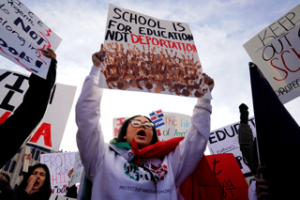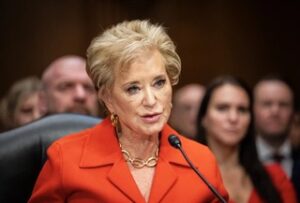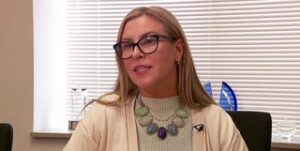
Protesters rally in Oklahoma City
BY DEBRA KEEFER RAMAGE
State and nationwide education news
We may as well lead off by addressing the huge elephant in the room: the unfolding story of Trump 2.0, and particularly the administration’s bumbling efforts to eliminate the Department of Education.
There is a lot of linkage, and overlap, between this “crusade” and the more effective (shockingly so) efforts to stamp out all vestiges of Diversity, Equity, and Inclusion (DEI) in all areas of American life, public and private. That should not be surprising. A Feb. 15 article in Time explores and explains the intertwined history of federal education policies and attitudes about equality and access. Time: “President Donald Trump says he is preparing an executive order to shutter the Department of Education. But this idea is hardly a new one: it has been a part of conservative Republican orthodoxy since 1980, when candidate Ronald Reagan promised to close the newly opened department. [In fact] the idea of eliminating the Department of Education — and any federal control over education — is even older than that. The history goes back all the way to the Civil War and to America’s foundational struggle over slavery, citizenship, and federalism.”

Linda McMahon, Donald Trumps Secretary of
Education pick
A federal Department of Education was set up as part of the Reconstruction program under President Andrew Johnson in 1867, but within a year, it had been demoted to an obscure office and soon withered away. It wasn’t until almost 100 years later that the Carter administration enacted the present DoEd, in 1979. In 1981, newly elected President Reagan started trying to dismantle it, and so has every Republican administration since, and a couple of neoliberal Democratic ones as well.
Just as the Civil Rights Movement — and many BIPOC and immigrant communities today — see education as the first and vital step on the path to equality, those who oppose racial equality or immigration start their campaigns by attacking schools, the teaching of history in schools, the use of the language that describes values like equality and justice, and the foundational idea of free public education itself. Read this great piece in Time for all the details: time.com/7225339/history-efforts-end-department-of-education.
As for what the future holds, The American Century has this to say: “While outright abolishing the department would require an act of Congress, the administration is expected to try to get as close as possible through executive actions — even when those actions may be illegal. There are many unknowns in terms of how this might play out in the executive branch and through legal challenges in the courts, but all of the likely scenarios create harmful risks for students and families.” Read the whole piece here: tinyurl.com/DKRatSSP-DoEd.
Here is a bonus — a video of Sen. Bernie Sanders grilling Trump’s choice for heading the Department of Education, Linda McMahon: tinyurl.com/DKRatSSP-BernievTrumpsPick.
Other assaults on the federal support of DEI and on immigrant populations are already underway as I write this in February, and they are having a major negative impact on schools, students, families, and educators. In addition to wrecking the government, the main Trump 2.0 agenda is to deport all the immigrants — and a few thousand citizens that get swept up by accident — rewrite history, repeal all civil rights laws, and just make trans people go away and not exist.
Sahan Journal published a piece on how schools are planning to protect kids in advance of anticipated ICE raids when a late January Executive Order rolled back the limits on ICE raiding “sensitive areas,” including schools and churches. See tinyurl.com/DKRatSSP-SchoolsvICE.
In other state and national news:
• What could education look like without high stakes testing? recorder.com/doug-selwyn-dec-14-58264468
• Gov. Walz proposes $109 million budget cut that would eliminate aid for private school students. MinnPost, Peter Callaghan, Feb. 17
• Rethinking Schools Spring 2024 issue focuses on “Teaching Palestine”. rethinkingschools.org/issue/volume-38-no-3
• See Sahan Journal’s top five education stories of 2024 listed by Becky Z. Dernbach. sahanjournal.com, Dec. 23, 2024

MPS parent Muna Garad, showing support for heritage
language programs
Zeroing in on Minneapolis Public Schools (MPS)
We ended our October 2024 piece with a cliffhanger; MPS board member Faheema Feerayarre — representing District 3 — had resigned in September, and a replacement was to be appointed in November. Meanwhile there was an election pending for District 6. In early November, Greta Callahan — former president of the MPS educators’ union (MFT) — was elected to the school board, and in mid-November, the school board voted to appoint Lucie Skjefte as the District 3 representative. Skjefte is the chair of the MPS American Indian Parent Advisory Committee, is a member of the Red Lake Nation, and has a son attending Southwest High School.
The picture is still not all rosy at MPS. Budget cuts last for at least a year, and then, in the case of school systems, they usually get cut again. Although the tech levy did pass in November — thank you, Minneapolis voters! — the same systemic problems are around. In December, Sahan Journal reported that one in five Minneapolis elementary schools exceed limits on class sizes. Parents and teachers are still complaining about the redistricting project, which started before the COVID epidemic and was not halted, despite the numerous challenges.

MPS Board student reps.
But there is still a lot to celebrate in MPS, and some of the most troublesome aspects are improving or were averted due to the many activists and parents who show up to school board meetings. We briefly covered in October the story about heritage language programs, and how they were pulled back from the brink. The then-new superintendent even formally apologized to parents for the stress of having to fight for these vital programs. But they were saved, and these programs are unique and exemplary, in MPS, in Saint Paul, and elsewhere in Minnesota.
Another big point of pride is in our student body. Whereas most school boards have no student representation, the MPS board now has two student representatives on it. The school board reps for the 2025 school year are Isiah Martin and Lyn Ampey, who started their 11-month term in February. The MPS website gives their biographies:
At Camden High School, Isiah Martin is an active student leader in his school community, and is part of the Camden Beacons Leadership Team (BLT), Good Trouble, BSU, and Student Council. He has been involved in the “Change the Name” process that renamed Camden from its former name, Patrick Henry High School.

MPS Board District 3 rep. Lucie Skjefte
At Southwest High School, Lyn Ampey started a club dedicated to teaching students about the medical field and post-high school careers paths in medicine, for which she has a passionate interest. In addition to being a member of the National Honor Society and the Black Student Union, Ampey is also a member of Southwest’s Site Council.
If you’re primarily interested in MPS and its board, you can get the whole scoop on the present school board members and information on how to attend school board meetings at the MPS website mpschools.org. Also check out the Dashboard on that site for in-depth access and data on all of MPS’s controversies, plans, failures, and successes.
Higher education — news and views
Some of the earliest attacks from the Trump administration hit U.S. universities and colleges, including MN state and non-state institutions. Funding cuts from the outset hit academic research especially hard, upending college and university budgets. Schools of Education find that a significant chunk of their curriculum will be impacted, if not made non-compliant in toto, by Executive Orders reversing decades of DEI policy and practice.
A Sahan Journal article from Feb. 7 explains details of the University of Minnesota’s scramble to comply, along with pushback efforts of faculty and students. Telling the story from the viewpoint of a young law professor who successfully advocated for more support for students of color, the piece by Becky Z. Dernbach describes events unfolding in January and early February: “William McGeveran, dean of the law school, announced the hiring pause in a January 31 email to law school students, faculty and staff.

MPS Board District 6 rep. Greta Callahan
“‘As you are all aware, in the last few weeks the national landscape for higher education has shifted. In response, the University is reassessing many programs, including those related to diversity, equity, and inclusion,’ he wrote.
“He stressed that he had been working closely with university administrators and ‘advocating against overreaction.’
“‘Nonetheless, in light of this ongoing reassessment, it is clear that we have no choice but to pause the search for our next assistant dean of diversity, equity, and inclusion,’ he wrote. ‘The upcoming finalist visits that were scheduled will be canceled.’ “
Bring Me the News covered the story of 185 Special Education students at

Illustration by Sophia Foster-Dimino for Teaching Young Children About Gaza.
St. Thomas whose grants were canceled by the new administration in early February: “The University of St. Thomas is planning to appeal a decision by the federal government after it canceled a grant program that impacts 185 students pursuing careers in special education, amid wide-ranging cuts by the Trump Administration on previously approved federal funding.
“A spokesperson for the university tells Bring Me the News the purpose of the federal grant originally awarded in 2023 was ‘to help address teacher shortages through scholarships and recruiting and preparing special education and elementary school teachers’ in the state.”
In this case, they may be able to have the cuts reversed since DEI is not the main purpose of these grants. But for scores of similar programs, in Minnesota and across the country — whether providing tuition help, funding faculty positions, or enabling research — if courts uphold Trump’s orders to end DEI, there may not be much recourse.






















